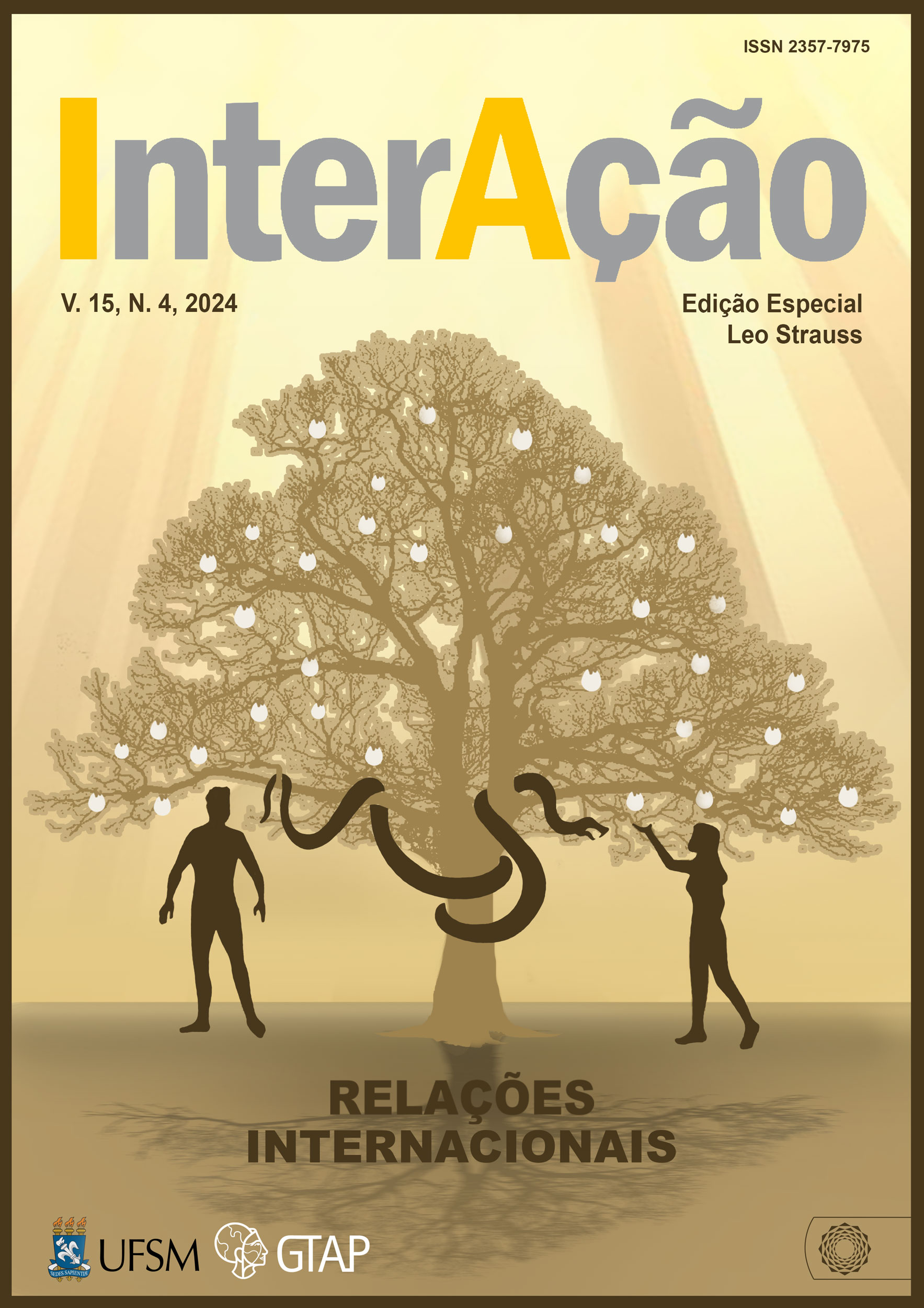¿Qué tan crítica es la crítica de Strauss a la modernidad? La alternativa de Heinrich Meier
DOI:
https://doi.org/10.5902/2357797589748Palavras-chave:
Heinrich Meier, Leo Strauss, Modern political philosophyResumo
El diagnóstico y la interpretación que Leo Strauss realizó de la filosofía política moderna han sido leídos generalmente como una profunda crítica al dogmatismo con el que la Modernidad erigió su ciencia política al tiempo que obscureció la vida filosófica y el tratamiento de los asuntos humanos. Los lectores de Strauss son ahora confrontados con algunas sagaces interpretaciones que ponen en tela de juicio que tal sea la verdadera intención de Strauss en su lectura de los filósofos modernos. Especialmente Heinrich Meier ha atendido con detalle la obra straussiana de tal modo que, bajo un análisis cuidadoso, autores como Maquiavelo, Hobbes o Rousseau son desde la pluma de Strauss auténticos filósofos y, en consecuencia, el proyecto de la Modernidad se revelaría como una resolución política que salvaguarda la vida filosófica frente al reto de la religión revelada. En este ensayo abordaré brevemente los puntos más álgidos de la interpretación general de Meier y cuestionaré algunas de sus premisas. Se sostiene, en resumen, que de ser cierta la interpretación de Meier el acercamiento a Strauss ha de ser tomado con una cautela moral incluso mayor a la que sus lectores estamos acostumbrados.
Downloads
Referências
BRANN, E. (2025). Jacob Klein’s Two Prescient Discoveries. En Daniel, M., & Andrew, R. (Eds.). To Turn the Soul. Essays Inspired by Jacob Klein. Paul Dry Books.
BURNS, T. (2021). Leo Strauss: On Democracy, Technology, and Liberal Education. State University of New York Press. DOI: https://doi.org/10.1515/9781438486154
KUHN, H. (2022). Naturrecht und Historismus. En Leo Strauss, Gesammelte Schriften: Naturrecht und Geschichte (H. Meier, Ed.; Vol. 4). Felix Meiner.
MACHIAVELLI, N. (1971). Tutte le opere (M. Martelli, Ed.). Sansoni.
MEIER, H. (2022a). Vorwort des Herausgebers. En Leo Strauss, Gesammelte Schriften: Naturrecht und Geschichte (H. Meier, Ed.; Vol. 4). Felix Meiner.
MEIER, H. (2022b). Philosophie und Geschichte. En Leo Strauss, Gesammelte Schriften: Naturrecht und Geschichte (H. Meier, Ed.; Vol. 4). Felix Meiner.
MEIER, H. (2022c). Vorwort des Herausgebers. En Leo Strauss, Gesammelte Schriften: Hobbes’ Politische Wissenschaft und zugehörige Schriften – Briefe (H. Meier, Ed.; Vol. 3). Felix Meiner.
MEIER, H. (2013). Politische Philosophie und die Herausforderung der Offenbarungsreligion. C.H.Beck. DOI: https://doi.org/10.17104/9783406654756
MEIER, H. (2006). Leo Strauss and the Theologico-Political Problem (M. Brainard, Trad.). Cambridge University Press. DOI: https://doi.org/10.1017/CBO9781139177948
MEIER, H. (2005, mayo 24). Why Leo Strauss? Four Answers and One Consideration concerning the Uses and Disadvantages of the School for the Philosophical Life. Leo Strauss: The Man, His Thought, and Contemporary Global Politics, Roma. El texto de esta conferencia me ha sido facilitado por el autor.
MEIER, H. (2003). Das Theologisch-politische Problem. Zum Thema von Leo Strauss. Metzler. DOI: https://doi.org/10.1007/978-3-476-02934-8
MEIER, H. (2002). Der Philosoph der Stunde. Focus, 27.
MINKOV, S. (2016). Leo Strauss on Science. State University of New York Press. DOI: https://doi.org/10.1515/9781438463131
PIPPIN, R. (1992). The Modern World of Leo Strauss. Political Theory, 20(3), 448–472. DOI: https://doi.org/10.1177/0090591792020003004
ROLLANDI, I. (2023). Maquiavelo el filósofo: La interpretación de Leo Strauss [Tesis doctoral]. Universidad de Buenos Aires.
STRAUSS, L. (2022a). Gesammelte Schriften: Hobbes’ Politische Wissenschaft und zugehörige Schriften – Briefe (H. Meier, Ed.; Vol. 3). Felix Meiner. DOI: https://doi.org/10.1007/978-3-476-03542-4_1
STRAUSS, L. (2022b). Gesammelte Schriften: Naturrecht und Geschichte (H. Meier, Ed.; Vol. 4). Felix Meiner.
STRAUSS, L. (2013). Gesammelte Schriften: Philosophie und Gesetz, Frühe Schriften (H. Meier, Ed.; Vol. 2). Metzler. DOI: https://doi.org/10.1007/978-3-476-00728-5_1
STRAUSS, L. (2000). On Tyranny (V. Gourevitch & M. Roth, Eds.). The University of Chicago Press.
STRAUSS, L. (1997). Jewish Philosophy and the Crisis of Modernity (K. Hart, Ed.). State University of New York Press.
STRAUSS, L. (1989). An Introduction to Political Philosophy (H. Gildin, Ed.). Wayne State University Press.
STRAUSS, L. (1982). Spinoza’s Critique of Religion (E. M. Sinclair, Trad.). Schocken Books.
STRAUSS, L. (1965). Natural Right and History. The University of Chicago Press. DOI: https://doi.org/10.7208/chicago/9780226226453.001.0001
STRAUSS, L. (1964). The City and Man. The University of Chicago Press [(2006). La ciudad y el hombre (L. Livchitz, Trad.). Katz]. DOI: https://doi.org/10.2307/j.ctvm7bctr
STRAUSS, L. (1963). The Political Philosophy of Hobbes (E. M. Sinclair, Trad.). The University of Chicago Press.
STRAUSS, L. (1962). Rousseau (1962). Curso de 1962 (J. Marks, Ed.). Disponible en leostrausscenter.uchicago.edu
STRAUSS, L. (1959). What is Political Philosophy. The University of Chicago Press.
STRAUSS, L. (1958). Thoughts on Machiavelli. The Free Press.
STRAUSS, L. (1952). Persecution and the Art of Writing. The University of Chicago Press.
STRAUSS, L. (1947). On the Intention of Rousseau. Social Research, 14(1/4), 455–487.
STRAUSS, L. (1946). On a New Interpretation of Plato’s Political Philosophy. Social Research, 13(3), 326–367.
TARCOV, N. (1991). On a Certain Critique of “Straussianism”. The Review of Politics, 53(1), 3–18. DOI: https://doi.org/10.1017/S0034670500050178
Downloads
Publicado
Como Citar
Edição
Seção
Licença

Este trabalho está licenciado sob uma licença Creative Commons Attribution-NonCommercial-ShareAlike 4.0 International License.







